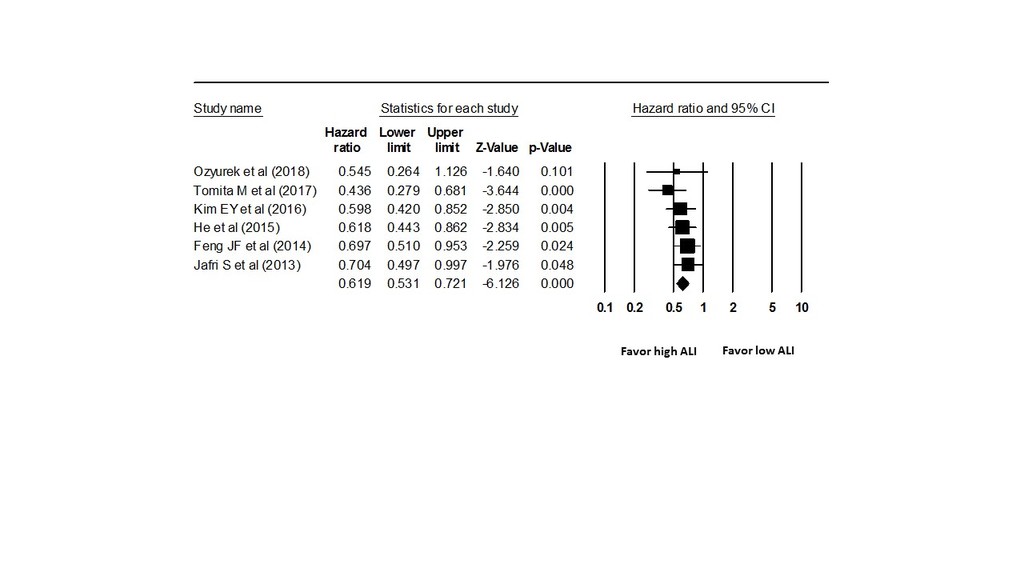Virtual Library
Start Your Search
Syed Hasan Raza Jafri
Author of
-
+
P3.01 - Advanced NSCLC (Not CME Accredited Session) (ID 967)
- Event: WCLC 2018
- Type: Poster Viewing in the Exhibit Hall
- Track:
- Presentations: 1
- Moderators:
- Coordinates: 9/26/2018, 12:00 - 13:30, Exhibit Hall
-
+
P3.01-46 - Prognostic Utility of Advanced Lung Cancer Inflammation Index (ALI) in Thoracic Malignancies: A Meta-Analysis (ID 11804)
12:00 - 13:30 | Presenting Author(s): Syed Hasan Raza Jafri
- Abstract
Background
Introduction: We developed ALI as a prognostic marker in metastatic non-small cell lung cancer. ALI has now been validated in a variety of cancers. Here we report a meta-analysis of ALI as a prognostic marker in thoracic malignancies
a9ded1e5ce5d75814730bb4caaf49419 Method
Methods: ALI is calculated as follows: ALI= BMI x ALB/NLR, where BMI= body mass index, ALB=serum albumin, NLR=Neutrophil/lymphocyte ratio. ALI <18 is a marker of shorter progression free and overall survival. We searched database in PubMed up until January 31, 2018. We selected all the studies that compared the survival of patients with thoracic malignancies according to their ALI. We used the random effect model to calculate the pooled hazard ratio of overall survival. Meta-regression analyses, heterogeneity of data and publication bias were also appreciated.
4c3880bb027f159e801041b1021e88e8 Result
8eea62084ca7e541d918e823422bd82e Conclusion Results: a total of 6 studies, all retrospective in design, were included in the meta-analysis. Among these, 3 evaluated the prognostic value of ALI score in non-small-cell lung cancer, 2 in small cell lung cancer and 1 in esophageal cancer. By random effect model, we detected a statistically significant higher overall survival for patients with high ALI score (AL≥18). This corresponded to a pooled of hazard ratio of death of 0.619 (95% confidence interval: 0.531-0.721, p-value <0.001), with the subgroups of patients with low ALI score used as reference. Interestingly, no heterogeneity of data was found (Q-value=3.598, I-square = 0.000, p=value=0.609). By meta-regression analysis, the covariate “type of tumor” (non-small cell lung cancer vs. others) did not influence the predictive value of ALI score (test of model Q-value=0.34, p-value=0.55). No publication bias was detected by Egger test (p-value=0.24).
Results: a total of 6 studies, all retrospective in design, were included in the meta-analysis. Among these, 3 evaluated the prognostic value of ALI score in non-small-cell lung cancer, 2 in small cell lung cancer and 1 in esophageal cancer. By random effect model, we detected a statistically significant higher overall survival for patients with high ALI score (AL≥18). This corresponded to a pooled of hazard ratio of death of 0.619 (95% confidence interval: 0.531-0.721, p-value <0.001), with the subgroups of patients with low ALI score used as reference. Interestingly, no heterogeneity of data was found (Q-value=3.598, I-square = 0.000, p=value=0.609). By meta-regression analysis, the covariate “type of tumor” (non-small cell lung cancer vs. others) did not influence the predictive value of ALI score (test of model Q-value=0.34, p-value=0.55). No publication bias was detected by Egger test (p-value=0.24).
Conclusion: ALI significantly correlate with prognosis in thoracic malignancies regardless of tumor type and should be used in clinical practice and research to identify high-risk patients.
6f8b794f3246b0c1e1780bb4d4d5dc53


